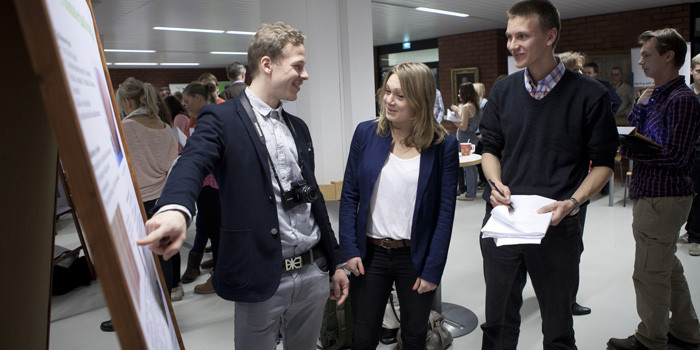Welcome to be an expert in sustainable development!
Welcome to be an expert in sustainable development!
The School provides education for a wide range of responsible future professionals. M.Sc. and Ph.D. graduates in technology work in diverse positions in Finland's largest industrial sectors, in the metal and electronics industry, wood processing industries as well as chemical, pharmaceutical, biotechnology and food industries. The research and teaching are supported by an extensive international academic and industrial cooperation network.
The School of Chemical Engineering combines natural sciences and engineering ing a unique way. This allows the results of our research to be refined a long way and put into practice as ready products and processes.
The School of Chemical Engineering has about 1 200 students studying towards a bachelor's or master's degree and about 400 full-time doctoral students. The number of professors is 35. In 2014, there were 141 bachelor's degrees completed, 147 master's degrees and 35 doctoral degrees. In addition to the degree students, the School welcomes every year a large number of international exchange students.
The next round of applications, i.e. for studies beginning in the autumn of 2017. The master's programme will be taught in English. Application period for Master's Programmes is 15 December 2016 - 25 January 2017.
There is a great deal of cooperation between the school and the business world and employment prospects are good. The school trains Masters of Science with the ability to lead the way in biotechnology and chemicals and materials technology and to be leading experts in leadership, design and research tasks for industry and its stakeholders, the scientific community and public administration. The degree programme provides students with skills and abilities to apply scientific knowledge and research methods independently and prepare for postgraduate education.

There are seven majors in the master's programme. The School offers also new Life Science Technologies programme.
The new master's programme will have seven majors:
- Biomass refining
- Fiber and polymer engineering
- Biotechnology
- Chemical engineering
- Chemistry
- Functional materials
- Sustainable metals processing
Biomass refining
Biomass refining constitutes the sustainable processing of biomass into a spectrum of marketable products and energy. The key technological contents of the major is treatment of biomass with tailored mechanical, chemical, biochemical and thermochemical processes leading to selective and efficient fractionation of the biomass components into functional fractions, and further refining of the fractions to fibres, polymers, chemical compounds and fuels or their reactants. The focus point of the major is the physiological function and structure of plants as well as the reactivity of the chemical components of lignocellulosic biomass in the conversion processes. Great attention is paid to process integration modelling, taking into account recycling and waste management. This includes the development of an integrated, rational and transparent evaluation framework for sustainable assessments, such as Life Cycle Assessments (LCA).
The major Biomass Refining applies knowledge of the fields of biotechnology, chemistry, and process technology.
Biotechnology
Graduates from the Biotechnology major have a strong multidisciplinary knowledge of biotechnology and engineering and the ability to apply this knowledge in a research and business environment. The major gives an in-depth understanding of molecular level biological phenomena, their modeling and application. At the core of the teaching are biotechnologically important organisms and enzymes, their properties, as well as their applications in products and processes. Students acquire practical skills and the ability to use key methods of biotechnology, including genetic engineering and synthetic biology, and learn to apply these tools to the development of biotechnological processes.
The major Biotechnology applies knowledge in the fields of biotechnology, chemistry and process engineering.
Chemical engineering
The Chemical Engineering major is based on a multi-scale perspective to underlying physical and chemical phenomena in chemical processes. It starts with molecular level origins of relevant phenomena, explains how processing unit level models and design practices emerge from them, and further considers integrated chemical plants and ultimately societal level effects. The emphasis is to educate engineers with a deep perspective on how natural sciences are applied with best engineering practices in Chemical Process Industries. The graduates of this major are capable of acting as chemical processing experts in various industries, are capable of evaluating designs and designing feasible and sustainable chemical processes with the help of modern tools.
Chemistry
The Chemistry major has a strong scientific basis in chemistry. It begins with molecular and quantum mechanical level description of matter and chemical reactions. The organic and inorganic study paths provide good knowledge on synthesizing and analyzing organic or inorganic materials. The physical chemistry study path focuses on electrochemistry and computational chemistry. In addition to the natural science basis, the major provides good knowledge in chemical engineering practices, especially when complementing the major’s courses with chemical engineering courses. The emphasis is on educating engineers capable of acting as chemistry experts in various branches of the industry and capable of solving chemistry related problems, such as planning reaction procedures and analyzing materials in detail.
Fiber and polymer engineering
This major concentrates on the structure, properties and engineering of fibers and polymers and on materials produced of them (fibers, composites, fiber networks, films, coatings, nanoscale structures, functional materials), as well as products (packaging, textiles) and their manufacturing techniques. The teaching focuses on natural materials, fibers and polymers, and polymer synthesis. The major rests on a foundation of research in material physics, chemistry and biomimetics, while also being connected to design through product solutions.
This major applies knowledge of material science and engineering and chemical technology.
Functional materials
This major deepens the students’ knowledge of material science, in particular of solid state physics and chemistry, surface and interface phenomena, and nano sciences. The key technological contents of the major are the development of novel functional materials for different purposes, such as energy production and storage, electronics and applications to mechanical engineering and medical technology. The major focuses on metals, ceramics, semiconductors, composites and hybrid and nano materials. Understanding the phases and phase transitions of matter creates the preconditions for understanding functional properties as well as for applying materials and developing them further.
This major applies knowledge of material physics and chemistry as well as material science and engineering on a broad scale.
Sustainable metals processing
The major Sustainable Metals Processing is a specialist field that deals with the extraction of metals and mineral products from primary and secondary resources through the application of scientific principles. Considered is the bigger cycle of materials linking rigorously to product design, material science, energy recovery and bio-materials.
The (extractive metallurgy) major focuses in a multi-scale approach to the relevant physical and chemical phenomena in the processes. It covers atom-level basics of relevant phenomena, explains how unit process level models and design practices can be derived from them, and considers integrated metals extraction plants and their material flows. An important factor is sustainability of metals extraction and the system approach allowing the availability of metals over their life cycles. The aim is to educate engineers with a deep understanding on how sciences are applied with engineering skills in the metallurgical industries. They will act as metallurgical processing experts in various industries, are capable of evaluating equipment and process designs and designing feasible as well as sustainable metals extraction processes with the help of numeric simulation tools.
Read more about the major (pdf)
Master's Programme in Life Science Technologies
Master's Programme in Life Science Technologies offers a multidisciplinary curriculum focusing on important aspects of current biomedical research, covering fields such as biological data analysis and modeling, advanced biomaterials and bioelectronics, biomedical engineering and neuroscience. The programme draws on fundamental and applied knowledge on these fields and is closely linked to research conducted in the participating Schools and Departments.


The School takes part in two Erasmus Mundus programmes:
EMMEP -European Mining, Mineral and Environmental Program
The Joint Master EMMEP is a two-year joint degree programme offered by five of Europe's leading universities in resource engineering and mining: Aalto University, Delft University of Technology, Miskolc University, RWTH Aachen University and Wroclaw University of Technology.
EMMEP builds on the strengths and the complementary expertise in Earth Science at the three universities per track. It offers you a combination of study and research, leading to an outstanding qualification in EMMEP. You can specialize in either Environmental and Geotechnical Engineering Course (EGEC), European Mining Course (EMC) or European Mineral Engineering Course (EMEC), and will receive a solid background in the specialisation area.
Read more:
SELECT - Environomical Pathways for Sustainable Energy Systems
The master's programme in Environomical Pathways for Sustainable Energy Systems (SELECT) offers advanced education in the field of sustainable energy systems for the future. SELECT aims at delivering education for high competency and quality engineering skills in the field, including industrial interaction throughout the programme.
The SELECT master's programme is a cooperation between:
- KTH Royal Institute of Technology, Sweden (KTH)
- Politecnico di Torino, Italy (PoliTo)
- Eindhoven University of Technology, the Netherlands (TU/e)
- Universitat Politècnica de Catalunya, Barcelona Tech, Spain (UPC)
- Aalto University, Finland (Aalto)
- AGH University of Science and Technology, Poland (AGH)
- Instituto Superior Técnico, Tecnico Lisboa, Portugal (IST)
Read more:

Incoming exchange students
Are you interested in exchange studies at School of Chemical Engineering? You can find all the information needed here (into.aalto.fi)

Contact
Aalto University School of Chemical Engineering
Street address: Kemistintie 1, Espoo, Finland
More detailed contact information
- Questions regarding the application process or documents: hakijapalvelut [at] aalto [dot] fi
- Questions regarding the content of studies and studies in the School of Chemical Engineering: studies-chem [at] aalto [dot] fi
-
Questions regarding exchange studies and application process: international-chem [at] aalto [dot] fi




